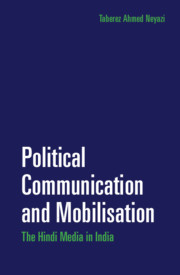Book contents
- Frontmatter
- Dedication
- Contents
- List of Figures, Tables and Maps
- Preface
- Acknowledgements
- Chapter 1 Introduction: Political Communication and Mobilisation in India
- Chapter 2 Under Colonial Rule: Mobilisation in the Hindi and English Press
- Chapter 3 Media and Mobilisation in Independent India
- Chapter 4 Localisation, Grassroots Mobilisation and Hindi News Media
- Chapter 5 Political Economy of the Hindi Press
- Chapter 6 The Hybrid Media System, Anti-corruption Movement and Political Mobilisation
- Chapter 7 Agenda-setting and Mobilisation in a Hybrid Media Environment
- Chapter 8 Conclusion: Politics, Power and Mobilisation in Digital India
- Bibliography
- Index
Chapter 2 - Under Colonial Rule: Mobilisation in the Hindi and English Press
Published online by Cambridge University Press: 17 August 2019
- Frontmatter
- Dedication
- Contents
- List of Figures, Tables and Maps
- Preface
- Acknowledgements
- Chapter 1 Introduction: Political Communication and Mobilisation in India
- Chapter 2 Under Colonial Rule: Mobilisation in the Hindi and English Press
- Chapter 3 Media and Mobilisation in Independent India
- Chapter 4 Localisation, Grassroots Mobilisation and Hindi News Media
- Chapter 5 Political Economy of the Hindi Press
- Chapter 6 The Hybrid Media System, Anti-corruption Movement and Political Mobilisation
- Chapter 7 Agenda-setting and Mobilisation in a Hybrid Media Environment
- Chapter 8 Conclusion: Politics, Power and Mobilisation in Digital India
- Bibliography
- Index
Summary
The press in India played an important role in framing the freedom struggle, not least because of the larger context of the debate between the Hindi and the English press on the issue of colonial rule. Hindi newspapers, which were mainly owned by Indians, stood in contrast to the newspapers owned by the British and Anglo-Indians in the way they framed the freedom struggle versus colonial rule. By aligning themselves with the freedom struggle against the British, Hindi newspapers were able to establish themselves as a significant vehicle for political communication during the colonial period. Yet, Hindi newspapers remained concerned with social and religious issues until the establishment of the Indian National Congress in 1885. Hindi newspapers were unable to contest the overall dominance of English newspapers because of the association of English as the language of modernity, which informed the subsequent development of Hindi and English newspapers in independent India. This chapter analyses the ways in which Hindi, other vernacular press and English newspapers framed colonial rule and helped mobilise public opinion.
Despite being region specific, the reach of the vernacular press was much greater than the percentage of the literate population due to the tradition of public reading of these newspapers on the street. These public readings contributed towards educating and mobilising the non-literate masses. In this manner, ‘much propaganda first appearing in print was passed on orally’ (Pandey, 1975, 207). The interactions between print and orality show the hybrid nature involved in mobilising public opinion that was present even during the colonial period. The power of the press was not only used by the Indian National Congress, which was looking for various platforms for propaganda, but even a revolutionary like Bhagat Singh used the press for spreading nationalist sentiments. Importantly, most of the national and provincial leaders in colonial India owned or were associated with newspapers which shows the importance attached to the press even in a predominantly illiterate society (Table 2.1).
- Type
- Chapter
- Information
- Political Communication and MobilisationThe Hindi Media in India, pp. 28 - 48Publisher: Cambridge University PressPrint publication year: 2017



